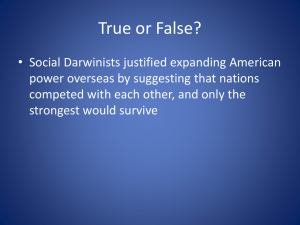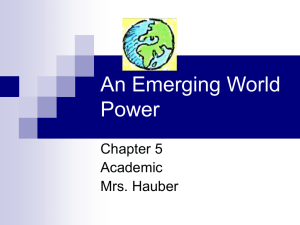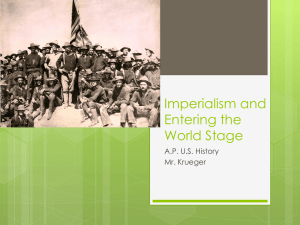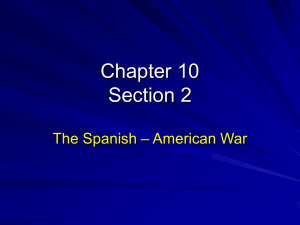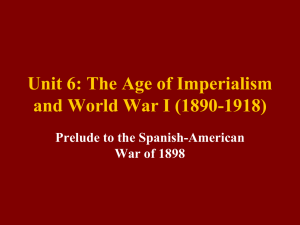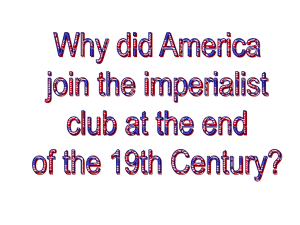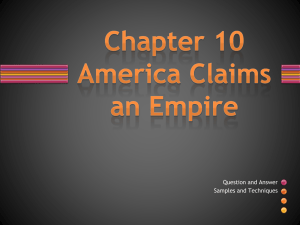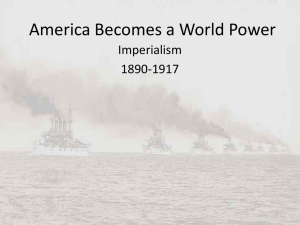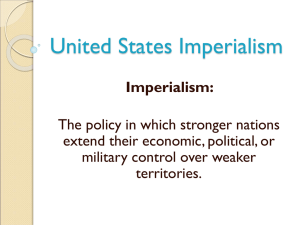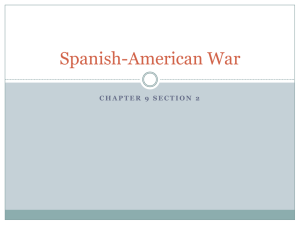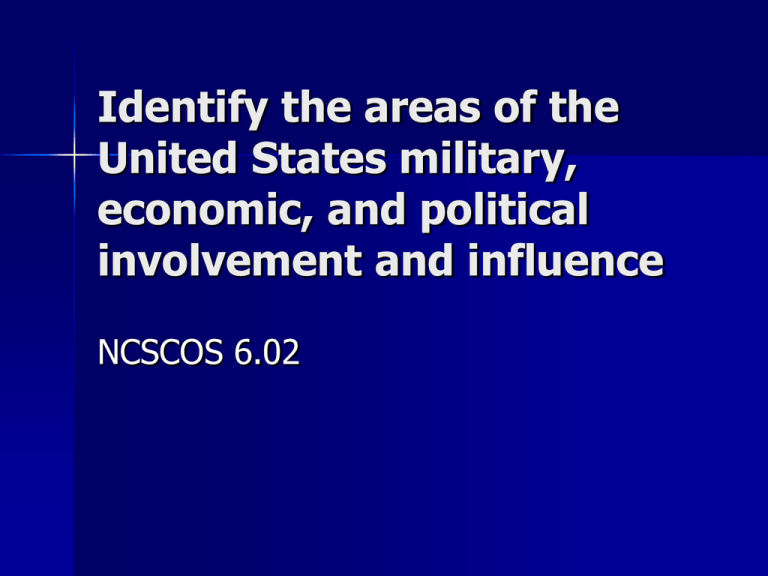
Identify the areas of the
United States military,
economic, and political
involvement and influence
NCSCOS 6.02
Macro Concepts
Micro Concepts
Conflict-problem or issue that
is controversial and can cause
problems without compromise.
Leadership- method of setting
examples for others to follow.
Power-authority of a
government to carry out the
law.
Resources-items such as wood,
metal and oil that can be used
to make finished products.
Imperialism-system of
government that has a larger
more powerful country taking over
weaker smaller countries.
Nationalism-extreme pride and
feeling of patriotism for one’s
country.
Economic Markets-places where
goods such as natural resources
and finished products are bought
and sold.
Social Darwinism-belief that
wealthy people have their status
because of their hard work,
intelligence, education. Poor are
that way because of poor work
ethic and laziness.
Yellow Journalism-type of
newspaper reporting that
exaggerates and sensationalizes
world events.
Seward’s Folly
• In 1867 [2 years after the end of the U.S. Civil War] Secretary of State
William Seward was able to get the U.S. Senate to agree to a treaty
with Russia to buy Alaska for $.02 per acre [totaling $7.2 million].
• The U.S. increased its size by about 20%. Eventually massive oil
deposits were discovered which the U.S. still uses today.
• A major result of this acquisition was that it wetted the appetite
[influenced] of the United States to become imperialist.
Annexation of Hawaii
Americans such as Sanford Dole
whose families had moved to
Hawaii in the 1830s and 1840s
were initially welcomed warmly by
Hawaii’s monarchy.
Fruit Planter Sanford Dole
After newer larger plantation
owners came to Hawaii in the
1870s and 1880s they pushed to
remove the Queen.
Rich fruit company owners led by
Dole’s descendants convinced the
U.S. military to dethrone and
remove Queen Liliokalani.
Hawaii was officially annexed
[taken over] by the U.S. in 1898. It
later became the 50th state in 1959.
Hawaii’s Queen
Liliokalani
USS Maine
A U.S. warship was sent to Havana Harbor in Cuba to protect U.S. interests in
1898.
Cuba at the time was still a Spanish possession.
There was tension between the U.S. and Spain because Spain held territories
within the United States’ sphere of influence.
Aboard the USS Maine were tons of explosives that were not tightly guarded or
secured.
A huge explosion occurred killing at least 266 U.S. personnel.
U.S. newspaper articles speculated that Spain had sunk the ship. The U.S.
declared war on Spain and defeated her within 113 days.
Splendid Little War
Due to the aggression and strong naval
power of the United States it was able
to defeat Spain with 113 days.
Secretary of War John Hay wrote a
short letter to President Teddy
Roosevelt from London stating that he
thought the Spanish-American War had
been a “Splendid Little War.”
He most likely believed this because:
[a] it was short and the United States did
not suffer large numbers of casualties
[b] the U.S. acquired several territories.
The Philippines
The spirit of Jingoism throughout the United States had spread as the war
with Spain spread to Asia.
Commodore [High ranking U.S. Navy officer] George Dewey was in charge
of the invasion of the Philippines which was also a Spanish colony.
To make the invasion easier and more successful Dewey reached out to a
Filipino rebel named Emilio Aguinaldo to help fight the Spanish.
Within weeks of the invasion the Philippines was captured by the U.S.
The Rough Riders
Due to the destruction and low morale created by the U.S. Civil War the U.S.
Military [especially the army] had very low numbers.
In order to field a force able to battle Spain in the so-called Spanish-American
War more than 1,000 volunteers were called to serve by President McKinley.
Former NYC police commissioner and state legislator Theodore Roosevelt was
selected as second in command of the 1st Cavalry Brigade.
Teddy Roosevelt
The Rough Riders
Many of the soldiers were very
experienced.
Veterans of the U.S. Civil War and
Western Indian Wars were eager to
see action in Cuba.
The group included gamblers, army
veterans, hunters, Buffalo soldiers,
Native-Americans and college
students.
Within weeks of their arrival in Cuba
the Rough Riders were triumphant in
key battles including the famous and
decisive Battle of San Juan Hill.
Their exploits enabled the U.S. to
defeat Spain and liberate Cuba.
Lt. Colonel Roosevelt
The Panama Canal
The Panama Canal was completed by
the U.S. after a long and dangerous 10
year construction.
France had earlier failed miserably in its
attempt to build the Canal.
Many people died during the long,
tedious and dangerous construction.
THE PURPOSE OF THE CANAL WAS TO
ENSURE THAT MARKETS IN SOUTH
AMERICA AND ASIA WOULD BE
OPENED TO THE UNITED STATES.
The Panama Canal shortened shipping
time and distance between the U.S. and
Latin America as well as Asia.
The Teller Amendment and Cuba
President McKinley sought authority [War Message] from Congress to
attack Spain as revenge for the USS Maine.
Senator Teller of Colorado added an amendment to the war
declaration that would forbid the U.S. from establishing a permanent
colony in Cuba.
Cuba would be liberated and allowed to be an independent nation.
Assignment: Response to the USS Maine Explosion
You just read a newspaper article written by yellow
journalists about the explosion of the USS Maine.
What should we do about it?
Did we get attacked by Spain or was the explosion just a
mistake? Could American sailors have made a mistake
causing 266 Americans to die?
Give some advice to the President of the United States
[William McKinley]. How should the United States respond?
Think about all the possibilities, consequences and benefits
if we attack.
Write a one page letter [to anyone of your choice] or 6 panel
cartoon strip describing or explaining what the president
should do in reaction to the explosion of the U.S.S. Maine.
Yellow Journalism
Both new immigrants and long standing Americans had a “hunger for words.”
Inexpensive newspapers were common in every major city and most people at
least read the Front Page Headlines. Most people believed anything that was
written in the newspapers
Joseph Pulitzer and William Randolph Hearst competed for readers and
lucrative advertising dollars by publishing sensational and scandalous stories.
Crime, corruption, sex and scandal attracted readers to the daily newspapers.
The money and influence gained by these newspapermen struck fear in the
hearts of their enemies and the government.
Pulitzer
Hearst
Treaty of Paris in 1898
President
McKinley
Spain’s foreign minister
U.S.
Secretary of
State John
Hay
In order to end the Spanish-American War Spain and the U.S. met in Paris
to sign a peace agreement called the Treaty of Paris [several earlier
treaties were also called that].
The most important part of the agreement was the transfer of Puerto Rico,
Guam and Cuba to the U.S. [Cuba was later given its independence]. The
Philippines was later purchased for $20 million by the U.S. The U.S.
Senate ratified the treaty 2 months later.
The Platt Amendment
The Platt Amendment was added to a federal law in 1901.
The purpose of the Platt Amendment was to ensure that Cuba would
remain tied to the United States [even after independence].
The following conditions were placed on Cuba:
[a] Cuba must not make treaties that would weaken its independence.
[b] Cuba must allow the U.S. to buy or lease the Guantanamo Bay naval
base.
[c] Cuba must keep debts low to avoid foreign conflicts and wars.
[d] The U.S. reserved the right to involve itself to maintain order and
independence .
President Wilson’s Mexican problem
Mexican rebel leader
Pancho Villa
After territorial acquisitions in Latin America and Asia the United
States had a “reputation” to maintain.
The Monroe Doctrine and Roosevelt Corollary set precedents for the
U.S. to show force in its sphere of influence.
In the 1910s corruption and political unrest led to a revolution in
Mexico.
The Mexican Army overthrew its corrupt dictator Porfirio Diaz and
replaced him with General Victoriano Huerta.
The U.S. was not pleased with the situation and with military force
[naval bombardment] installed a new president that Mexican rebels
hated Venustiano Carranza.
The Elusive Pancho Villa and General Black Jack Pershing
Mexican forces led by rebel Pancho Villa would not accept President
Carranza and as a result conducted raids [swift, violent military invasions]
into U.S. areas such as New Mexico and Arizona.
U.S. President Wilson sent General Pershing into Mexico to capture Villa to
end the raids.
Pershing was never able to find and capture Villa who to many Mexicans
became a symbol of independence and defiance of the United States.
Other people simply called Villa a lawless bandit.
U.S. Army General Jack Pershing
Mexican rebel leader Pancho Villa
Assignment: Front Page Newspaper editorial
Create a front page for a newspaper in the sensationalist yellow journalist style.
You must have the following:
[a] “catchy” and “sensationalist” headline across the top of the newspaper
[b] newspaper name such as The Daily News
[c] a correct date
[d] author’s name [yours or a “made up” name].
[e] have at least 5 of the terms we learned in Objective 6.02 for 5 separate articles on
your front page
[f] have at least 5 detailed and descriptive sentences for your articles
[g] have at least one matching image for each article
[h] spelling and grammar count so use a dictionary and ask me for assistance if you
need it.
Image sources
http://www.sdpb.org/EducationalServicesGuide/etvprograms/pdf/19thMaps/AlaskaSewards_Folly.jpg
http://www.freshplaza.com/2009/0611/dole.jpg
http://media-3.web.britannica.com/eb-media/20/8320-004-580DECCC.jpg
http://onlineartdirector.com/history_pages/spanish-american_war.jpg
http://wwwdelivery.superstock.com/WI/223/4048/PreviewComp/SuperStock_40481998.jpg
http://travel-island.com/countrymaps/philippines.gif
http://rpmedia.ask.com/ts?u=/wikipedia/commons/thumb/2/2b/John_Hay_signs_Treaty_
of_Paris%2C_1899.JPG/250px-John_Hay_signs_Treaty_of_Paris%2C_1899.JPG
http://www.iancfriedman.com/wp-content/uploads/2010/01/headline6.gif
http://www.old-picture.com/american-history-1900-1930s/pictures/Pancho-Villa-002.jpg
http://1.bp.blogspot.com/_femhrxbNtS0/SyMWu9xoWbI/AAAAAAAACwg/9PmkjKYoXw8/s
400/PERSHING.jpg
http://www.freedomarchives.org/La_Lucha_Continua/images/pancho_villa.jpg
http://www.telovation.com/photos/newspaper-headlines-hitler-dead.jpg

